|
|
|
Sort Order |
|
|
|
Items / Page
|
|
|
|
|
|
|
| Srl | Item |
| 1 |
ID:
171355
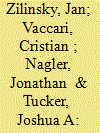

|
|
|
|
|
| Summary/Abstract |
Michael Jordan supposedly justified his decision to stay out of politics by noting that Republicans buy sneakers too. In the social media era, the name of the game for celebrities is engagement with fans. So why then do celebrities risk talking about politics on social media, which is likely to antagonize a portion of their fan base? With this question in mind, we analyze approximately 220,000 tweets from 83 celebrities who chose to endorse a presidential candidate in the 2016 U.S. presidential election campaign to assess whether there is a cost—defined in terms of engagement on Twitter—for celebrities who discuss presidential candidates. We also examine whether celebrities behave similarly to other campaign surrogates in being more likely to take on the “attack dog” role by going negative more often than going positive. More specifically, we document how often celebrities of distinct political preferences tweet about Donald Trump, Bernie Sanders, and Hillary Clinton, and we show that followers of opinionated celebrities do not withhold engagement when entertainers become politically mobilized and do indeed often go negative. Interestingly, in some cases political content from celebrities actually turns out to be more popular than typical lifestyle tweets.
|
|
|
|
|
|
|
|
|
|
|
|
|
|
|
|
| 2 |
ID:
116455
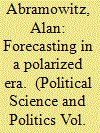

|
|
|
|
|
| Publication |
2012.
|
| Summary/Abstract |
The 2012 presidential campaign takes place at a time of deep political division in the United States. Democrats and Republicans differ sharply over Barack Obama's performance in office as well as a wide range of issues ranging from government spending and health care to immigration and gay marriage. These divisions are shaping the strategies of the candidates and the outlook for November. Overwhelming majorities of Democrats and Republicans, including overwhelming majorities of independents who lean toward a party, can be expected to support their own party's nominee. As a result, the outcome will depend on which party does a better job of mobilizing its supporters and appealing to a small group of swing voters in 10 or 12 battleground states.
|
|
|
|
|
|
|
|
|
|
|
|
|
|
|
|
| 3 |
ID:
191033


|
|
|
|
|
| Summary/Abstract |
AS COULD be expected, discussions of a higher retirement age that began in France in 2023 stirred up wide-scale protests across the country. After several failed attempts to draw the National Assembly, the lower house of the French parliament, to her side, Prime Minister Elisabeth Borne, supported by President Emmanuel Macron, had no choice but to rely on Article 49.3 of the Constitution of France and sign the pension reform into law in circumvention of parliament...
|
|
|
|
|
|
|
|
|
|
|
|
|
|
|
|
| 4 |
ID:
152873
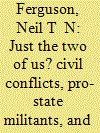

|
|
|
|
|
| Summary/Abstract |
Quantitative literature discussing violence in civil conflicts tends towards a typical model of engagement between governments and revolutionaries. Whilst recent work has shown the significant impact of multiple anti-government groups, a further feature remains understudied—the role of pro-state militants. This article theorizes a “violence premium” when such groups arise, which leads to all connected groups devoting greater energy to conflict than they would in isolation. Employing duration analysis and data from The Troubles in Northern Ireland, where Republicans act as revolutionary insurgents, Loyalists as pro-state militants, and the British Army as government forces, the violence premium is empirically confirmed. Both Loyalists and Republicans deviate from their underlying strategies to attack more frequently when violence by their rivals increases, with Republicans and the British Army engaging in the same way. An extended analysis, accounting for the status of the victim, shows that the violence premium resulting from interaction between Loyalists and Republicans targeted only the civilian population of Northern Ireland, elucidating the sectarian component of The Troubles. These results show that including all conflict parties and considering how they are linked are important features in studies that aim to determine the net level of violence in civil conflicts.
|
|
|
|
|
|
|
|
|
|
|
|
|
|
|
|
| 5 |
ID:
126422
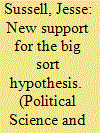

|
|
|
|
|
| Publication |
2013.
|
| Summary/Abstract |
This article empirically examines the "Big Sort hypothesis"-the notion that, in recent years, liberal and conservative Americans have become increasingly spatially isolated from one another. Using block group-, tract-, and county-level party registration data and presidential election returns, I construct two formal indices of segregation for 1992-2010 in California and evaluate those indices for evidence of growth in the segregation of Californians along ideological lines. Evidence of rising geographic segregation between Democrats and Republicans for measures generated from both party registration and presidential vote data is found. This growth is statistically significant for 10 of the 12 segregation measures analyzed. In addition, many of the increases are practically significant, with estimates of growth in segregation during the observation period ranging from 2% to 23%.
|
|
|
|
|
|
|
|
|
|
|
|
|
|
|
|
| 6 |
ID:
112066
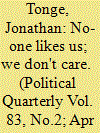

|
|
|
|
|
| Publication |
2012.
|
| Summary/Abstract |
The episodic dissident republican activity evident in Northern Ireland since the Good Friday Agreement has been accompanied by regular assertions from the police, politicians and commentators that dissidents have no backing. This article examines the historic importance of mandates and support for previous and contemporary republican armed campaigns. It explores whether violent republicans have ever enjoyed widespread support in Ireland and assesses the extent to which a lack of backing has precluded violent campaigns. The piece analyses the evidence regarding the lack of sympathy for current dissident violence, assessing the degree to which armed republicanism has reached a new level of isolation.
|
|
|
|
|
|
|
|
|
|
|
|
|
|
|
|
| 7 |
ID:
121610
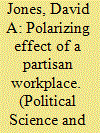

|
|
|
|
|
| Publication |
2013.
|
| Summary/Abstract |
The workplace provides an exceptional outlet for citizens to encounter different viewpoints and discuss politics with people with whom they may disagree. In Washington, DC, however, many people work in partisan environments where like-minded coworkers rarely encounter alternate points of view. Group polarization theory suggests that these environments push individuals to the partisan and ideological extremes. This study tests this hypothesis by comparing opinion change among interns who worked in a partisan workplace with that of interns who were employed in less-partisan environments. The results suggest that partisan workplace environments foster opinion polarization, especially among Republicans.
|
|
|
|
|
|
|
|
|
|
|
|
|
|
|
|
| 8 |
ID:
099531
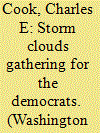

|
|
|
| 9 |
ID:
160803
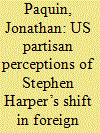

|
|
|
|
|
| Summary/Abstract |
While Stephen Harper’s foreign policy sparked heated debates during his entire tenure as prime minister, these debates were mainly confined to Canadian foreign policy circles. Little attention was paid to allies’ perceptions of these developments and, more specifically, to the perception of the United States, Canada’s main economic and security partner. How did the Bush and Obama administrations perceive these changes? Were they seen as a break from Canada’s past? Did Harper’s handling of foreign policy alter White House calculations with respect to Canada? Based on a series of semi-structured interviews conducted in Washington DC with executive officials a few months prior to the end of the Harper era in 2015, this essay shows that despite a widespread perception in Washington that Canada’s foreign policy approach had changed under Harper, partisanship was the main dividing line in terms of how this approach was perceived and assessed.
|
|
|
|
|
|
|
|
|
|
|
|
|
|
|
|
| 10 |
ID:
073812
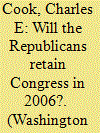

|
|
|
|
|
| Publication |
2006.
|
| Summary/Abstract |
Republicans are worried going into the 2006 midterm election, but the outcome is far from certain. In fact, certain structural barriers may help protect the Republican majorities in both the Senate and the House.
|
|
|
|
|
|
|
|
|
|
|
|
|
|
|
|
|
|
|
|
|